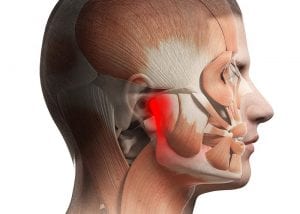by Oasis Wellness Partners on July 5, 2022

Yes we can!
Jaw pain is often referred to as TMJ. But what is TMJ? Temporomandibular joint syndrome is a flare up of the temporomandibular joints, which are the lower jaw hinges on the sides of the head directly in front of each ear. They are in charge of the lower jaw opening, closing, sliding, and rotating, important functions for talking, smiling, laughing, yawning, chewing, eating, and swallowing. The TMJs are very complex joints, and often used. The typical person uses them more than 5,000 times a day!
TMJ dysfunction or syndrome happens when one or both of the TMJ joints become inflamed or injured which can cause pain and immobility in the jaw, which can be quite painful and debilitating.
Both joints working well together is critical for function because being out of alignment can result in more pressure on one joint than the other. This can cause the pain and discomfort that is associated with TMJ syndrome.
The symptoms of TMJ syndrome may vary depending on the patient, the extent of inflammation or injury, and the cause of the dysfunction. The symptoms may appear suddenly when there is injury to the joint, or they can gradually develop over a period of months or even years. They may be mild and barely noticeable or they can be severe and debilitating. The most common symptoms of TMJ syndrome include:
TMJ syndrome can significantly impact a person’s quality of life because the pain prevents them from doing many things they normally do, such as talking or eating easily, and often the jaw itself becomes dysfunctional.
The primary cause of pain associated with TMJ syndrome is damage to the joint. This can be the result of trauma from:
However, repetitive movements can also cause TMJ dysfunction:
A misalignment can happen if the neck sustains trauma, such as whiplash. This can cause one side of the jaw to work harder or exert more pressure than the other, or it can put excess pressure on the trigeminal nerve. All of these can cause inflammation and irritation.
The condition can become severe if left untreated. Opening and closing the jaw pinches the disc so the joints are prevented from working as they should. Symptoms such as painful spasms in the shoulder and neck muscles can then happen when the patient does everyday activities like laughing, talking, smiling, or eating. And that is no fun!
Chiropractic can be a powerful treatment for TMJ syndrome. A chiropractor will perform spinal adjustments to the spine and neck, bringing the body back into proper alignment. This will release pressure and allow the jaw to work as it should. The patient may also be encouraged to do massage, apply heat and do jaw exercises that will help the joints heal and minimize pain.
Call us at our Scarborough, Maine office for TMJ Relief
We have has success treating patients suffering from TMJ symptoms for over 28 years. Come see us at our Southern Maine chiropractic office so that we can help you be in alignment. Call us to schedule your initial exam today at (207) 883-5549.